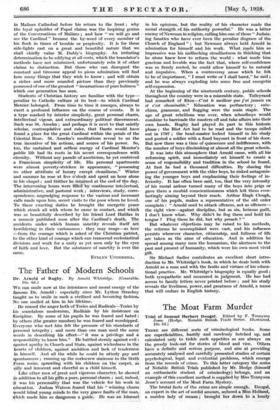The Father of Modern SchoOls
Dr. Arnold of Rugby. By Arnold Whitridge. (Constable.
10s. Bd.) • - WE can smile now at the -intentness and moral energy of the famous Dr. Arnold : especially since Mr. Lytton Strachey taught us to smile in such a civilized and becoining fashion. No one smiled at him in his lifetime.
He roused the anger both of Tories and Radicals:--Tories by his scandalous modernism, Radicals 'by his insistence on Aiacipline. By some of his pupils he was feared and hated by others (the greater number) he was feared and worshipped. Everyone who met him felt the pressure of his standards of personal integrity ; and more than- one man. used the same words in describing his effect—" it was a privilege and a responsibility to know him." He battled sternly against evil : against apathy in Church and State, against wickedness in the hearts of children, against ambition and lack of tendernesS in himself. And all the while he could be utterly gay and spontaneous ; running up the corkscrew staircase to the Sixth Form room, sprawling with his children on the Carpet, as silly and innocent and cheerful as a child hiniself.
Like other men of great and vigorous character, he showed n addition to all his gifts a pure, personal charm ; and, indeed, it was his personality that was the vehicle for his work in education. Joshua Watson feared that his " winning charm Would blind young minds to the very grave faults of the man, Which made him so dangerous a guide. He was an Ishmael in his opinions, but the reality of his character made the Moral strength of Ids authority powerful." He was a bitter enemy of Newman in religion, calling him one of those " Judaiz- ing fanatics who have ever been the peculiar disgrace of the Church of England " ; but Newman always held Arnold in admiration for himself and his work. What made him so impressive was his unflinching steadfastness in thinking that he alone knew how to reform the world : what -made him gracious and lovable was the fact that, where self-confidence was so firmly rooted, he could allow himself to be natural and impulsive. When a controversy arose which he felt to be of importance, " I must write or I shall burst," he Said ; and he was always exploding into some free and energetic self-expression.
At the beginning of the nineteenth century, public schools throughout the country were in a miserable state. Talleyrand
had remarked of Eton—C'est le meilleur que jamais vu et c'est abominable." Education was perfunctory ; cate- chism, grammar, and flogging were the main staple. The age of great rebellions was over, when schoolboys would combine to barricade the masters off and take affairs into their own hands. Rugby had played its part in this historic phase ; the Riot Act had to be read and the troops called out in 1797 ; the head-master locked himself in his study and posted a soldier with a fixed bayonet in front of his door. But now there was a time of quiescence and indifference, with the number of boys diminishing at almost all the great schools.
It was into this atmosphere that Arnold came, with all his reforming spirit, and immediately set himself to create a sense of responsibility and tradition in the school he found. At first he had a thousand difficulties. By sharing the power of government with the elder boys, he risked antagoniz- ing the younger boys and emphasizing their feelings of in- feriority. It has often been said, too, that the very intensity of his moral ardour turned many of the boys into prigs or gave them a morbid conscientiousness which left them ever- lastingly aiming beyond their reach. Arthur Hugh Clough, one of his pupils, makes a representative of the old order complain " Arnold used to attack offences, not as offences— the right view—against discipline, but as sin, heinous guilt, I don't know what. Why didn't he flog them and hold his tongue ? Flog them he did, but why preach ? "
But whatever objections may be raised to his methods, the reforms he accomplished were vast, and his influence persists wherever character, citizenship, and fullness of life are taken as the aims of education. And in addition he spread among many men the humanism, the alertness to the past and present of humanity, which were his own most vivid gift.
Sir Michael Sadler contributes an excellent short intro- duction to Mr. Whitridge's book, in which he deals both with Arnold as a man and with the faults and virtues of his educa- tional practice. Mr. Whitridge's biography is equally good ; both sympathetic and measured in judgment. He has had access to family letters never printed before ; and his study reveals the liveliness, power, and greatness of Arnold, a name that will endure in English history.








































 Previous page
Previous page